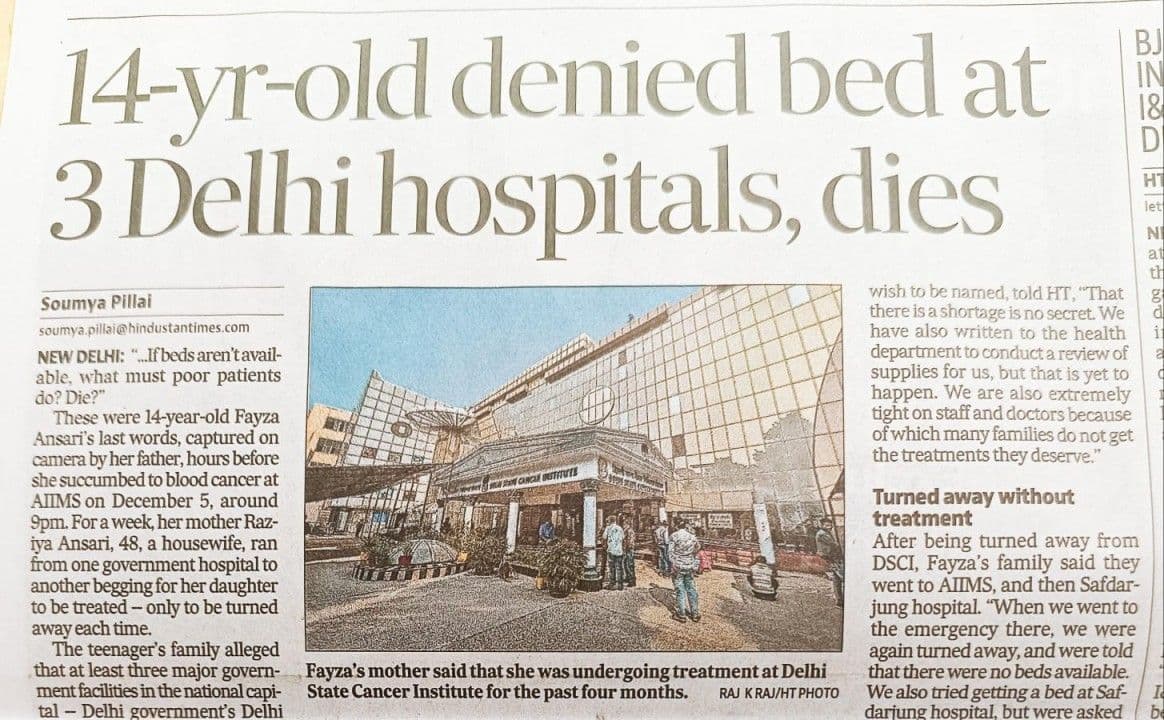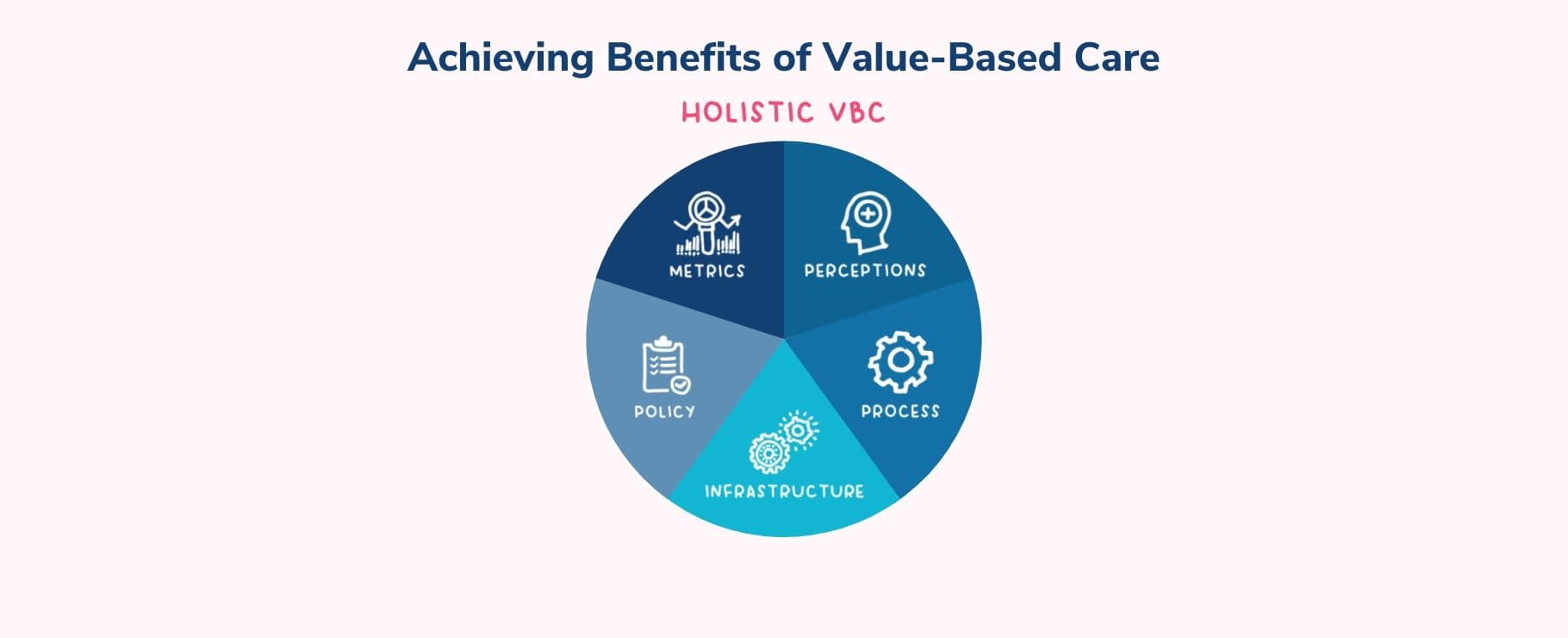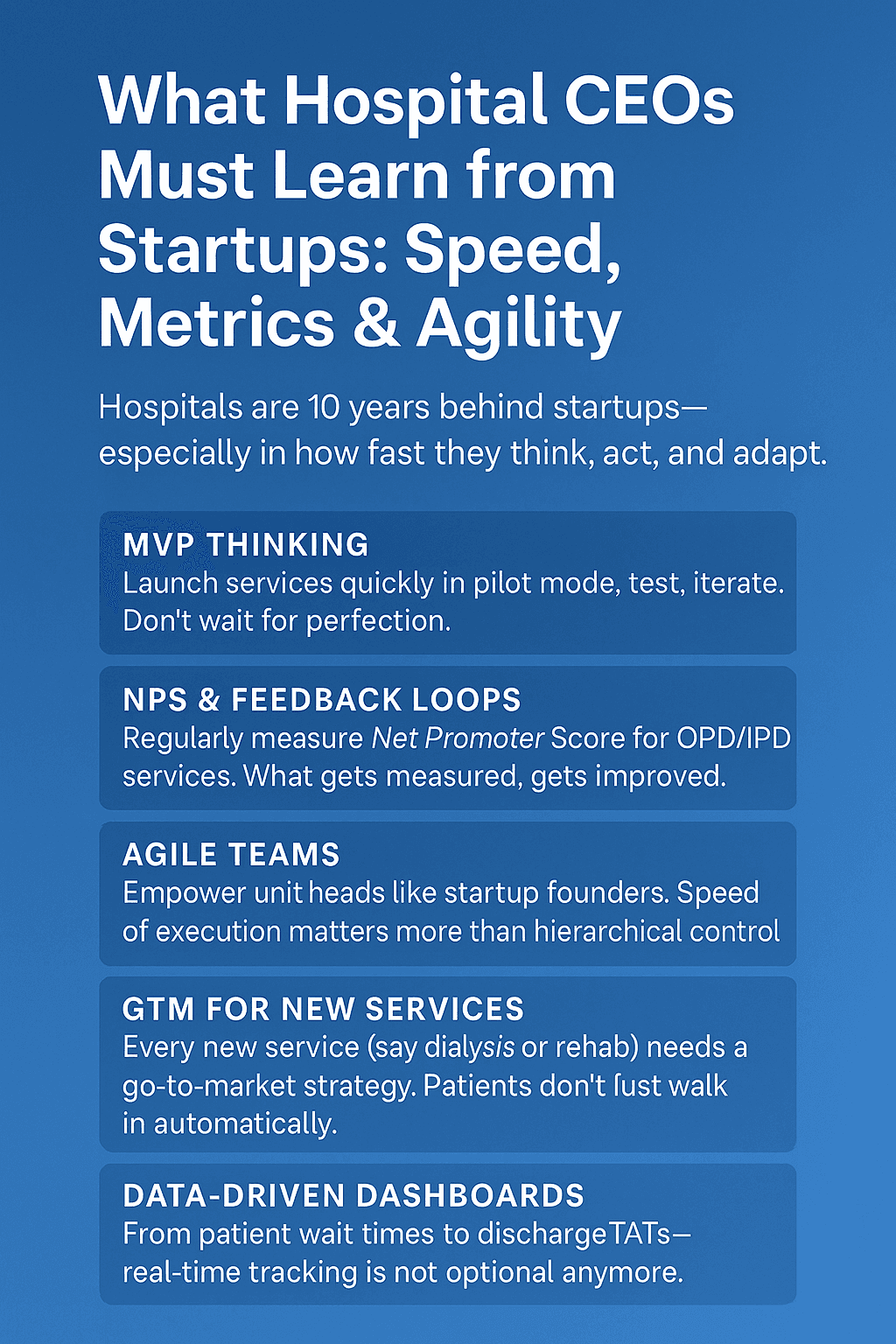Beyond Beds and Medicines: Unraveling the Healthcare Crisis in India

The Unseen Struggle: Overburdened Tertiary Hospitals vs. Underutilized Secondary Care
While tertiary hospitals like AIIMS grapple with overwhelming patient loads, secondary care hospitals, district hospitals, and primary health centers remain underutilized. The imbalance in the healthcare ecosystem needs urgent attention. We need to invest in strengthening the entire healthcare pyramid, ensuring that patients receive appropriate care at the right level.
Empathy-Driven Leadership: The Need of the Hour
What we truly need is empathy-driven leadership that understands the challenges faced by healthcare professionals. Leaders who can say, "Failure is mine, success belongs to the team." This cultural shift is imperative to instill confidence in our healthcare workforce and foster a collaborative approach to patient care.
Technology as an Enabler, Not a Monitor
Technology should be harnessed to ease the burden on doctors and nurses, freeing them from repetitive tasks. Innovative solutions should streamline processes, ensuring that healthcare providers can focus on what matters most – patient well-being.
A United Front: Bridging Gaps Between Government and Private Healthcare
We need a revolutionary system, perhaps a UPI-like innovation, facilitating seamless referrals between government and private hospitals. A transparent mechanism that echoes seat availability in airlines could help manage patient flow efficiently, preventing the unfortunate scenario of patients dying en route to hospitals due to bed unavailability.
Unfortunate Death -Bell must ring!India stands at a critical juncture in its healthcare narrative. The challenges faced by the U.S. and the U.K. in making emergency room beds available should serve as a stark warning. It's time for a comprehensive overhaul, addressing not just the shortage of beds and medicines but also the systemic gaps that hinder our healthcare delivery. A collaborative effort between the government, private sector, and the community is essential to prevent our healthcare system from heading down a perilous path.
Related Articles

Generic Medicines & the Rise of Jan Aushadhi Kendras in India: Promise, Pitfalls, and the Path Forward
In a country where millions fall into poverty due to healthcare costs, Jan Aushadhi Kendras have emerged as a lifeline — offering quality-assured generic medicines at 50–80% lower prices. Over 14,000 such stores now serve India’s most vulnerable. Yet, as journalist Durgesh Nandan Jha recently reported, the shift toward generics has sparked a nationwide debate: Is affordability enough without guaranteed quality? While many healthcare leaders hail the model as a landmark in access and equity, others warn of regulatory gaps, poor pharmacovigilance, and silent therapeutic failures. As one doctor put it, “A ₹1 paracetamol that doesn’t work is not affordable — it’s potentially fatal.” This article explores the ground reality behind the generics movement — blending data, diverse expert opinions, and a call to action: India must now evolve from “cheap drugs” to “trusted generics.”

🏥 Hospital Boards Are Getting It Wrong If Your KPI is OPD Footfall, You’re Missing the Bigger Picture
Most hospital boards in Tier-2 India still track outdated metrics—OPD footfall, bed occupancy, and monthly billing—as signs of success. But in 2025, that’s no longer enough. Today, clinical outcomes, patient satisfaction, and operational efficiency matter more. Recent SME IPOs of small hospitals like Broach Lifecare and Shanmuga Hospital show that investors are backing value, not volume. Hospitals that shift from counting patients to improving care quality will lead the future of healthcare. Boards must evolve from revenue watchers to outcome enablers. Because in healthcare, impact matters more than intake.

𝗪𝗵𝗮𝘁 𝗛𝗼𝘀𝗽𝗶𝘁𝗮𝗹 𝗖𝗘𝗢𝘀 𝗠𝘂𝘀𝘁 𝗟𝗲𝗮𝗿𝗻 𝗳𝗿𝗼𝗺 𝗦𝘁𝗮𝗿𝘁𝘂𝗽𝘀: 𝗦𝗽𝗲𝗲𝗱, 𝗠𝗲𝘁𝗿𝗶𝗰𝘀 & 𝗔𝗴𝗶𝗹𝗶𝘁𝘆
In today’s rapidly evolving healthcare landscape, traditional hospitals cannot afford to operate at yesterday’s pace. While startups are innovating at lightning speed—launching features, iterating on feedback, and scaling rapidly—many hospitals are still stuck in bureaucratic inertia, delayed decisions, and outdated management models. This article explores how hospital CEOs can adopt startup principles to drive operational efficiency, improve patient outcomes, and remain competitive. From MVP-based service launches to real-time dashboards, agile leadership structures, and data-driven decision-making, it outlines a practical roadmap for hospital leaders who are ready to embrace the mindset of a modern, patient-centric enterprise. The future of healthcare belongs to those who can move fast, measure right, and adapt with precision. It's time hospital leadership started thinking like entrepreneurs.

दिखावे के ज़माने में टूटते लोग: सोशल मीडिया, AI और हमारी अधूरी ज़िंदगी
सोशल मीडिया के इस तेज़ और चमकदार युग में, जहाँ हर मुस्कान में फिल्टर और हर रिश्ते में confusion है, वहाँ असली खुशी और सुकून दूर होता जा रहा है। हम सब दिखते बहुत 'happy' हैं, लेकिन अंदर से थके हुए, उलझे हुए और कभी-कभी टूटे हुए भी। AI से बात करना आसान हो गया है, पर अपने दिल की बात किसी अपने से कहना अब भी सबसे मुश्किल काम लगता है। ये लेख उसी नकली हँसी के पीछे छिपे दर्द, रिश्तों की उलझनों और mental health की सच्चाई को उजागर करता है – एक तंज, एक सच और एक कोशिश, कि शायद कोई पढ़कर रुक जाए... और खुद से या किसी से बात कर ले।

Syllabus ke bahar ka sawaal !
Busy in month-end closing? I bet you're deep in numbers: revenue, COGS, ROAS, margins, CAC, and all those financial metrics that keep the business world running. But let me ask you this: what about the numbers that truly matter? The numbers that can mean the difference between life and death?